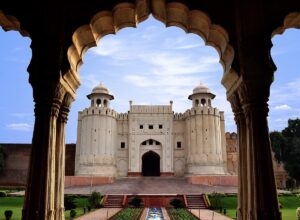 Lahore Fort – Built in 1566 by Mughal emperor Akbar is a UNESCO World Heritage Site
Lahore Fort – Built in 1566 by Mughal emperor Akbar is a UNESCO World Heritage Site
By Fasih Ullah khan: Lahore, the cultural capital of Pakistan, is a city that pulsates with rich history, vibrant culture and artistic beauty. Nestled in the heart of the Punjab province, Lahore has a rich and diverse past, a thriving present, and an optimistic future. Its historic significance, cultural heritage, and architectural marvels make it a city unlike any other in South Asia.
Lahore’s history dates back over a millennium. It has witnessed the rise and fall of numerous empires, each leaving a lasting imprint on the city’s landscape. The excavations carried out in late 1950 in Lahore Fort has revealed five distinct periods starting with the British going down to Sikh, Mughal, Ghazanvide and Hindu. During the historic period it was the Mughal era that left the most lasting imprints on the culture and the architectural legacy of Lahore. It was under the Mughals that Lahore truly flourished, becoming a hub of art, literature, and intellectual discourse.
The British colonial era saw Lahore becoming a significant center for education and administration. The city’s distinct architecture reflects this period, with colonial-style buildings juxtaposed with traditional Mughal structures.
Once the center of the Mughal Empire, Lahore is adorned with magnificent architectural marvels, from the awe-inspiring Badshahi Mosque to the stunning Lahore Fort. This city beautifully blends its historical significance with modern life, as bustling streets teem with people engaged in daily activities and an extraordinary culinary food scene that caters to all tastes.
Lahore, known as Pakistan’s culinary hub is a paradise for food lovers. Its bustling streets and vibrant markets provide an engaging exploration of a varied and tasteful culinary environment. From the sizzling kebabs and aromatic biryanis to the delectable street snacks like Golgappas (Fuchka in Bangladesh), samosas and Jalebis, Lahore’s food scene is a tantalizing fusion of traditional Pakistani flavors, regional delights, and innovative culinary creations. The love for food is deeply ingrained in Lahore’s culture, making it a must-visit destination for anyone eager to explore the vibrant and delicious world of Pakistani cuisine.
The people of Lahore, known for their warmth and hospitality, celebrate various festivals with great enthusiasm. In addition to events like National Horse and Cattle Show and various religious and cultural festivals, the annual Lahore Literary Festival is a testament to the city’s love for art, literature, and intellectual discussions.
Lahore is also a paradise for nature enthusiasts, offering meticulously maintained parks, including the renowned Shalimar Gardens, a UNESCO World Heritage Site, ideal for leisurely walks and picnics with loved ones. The intricate waterworks and symmetrical design of Shalimar Gardens make it a tranquil oasis in the heart of the city.
The Walled City of Lahore is a living example of the city’s rich cultural heritage and vibrant present-day activities. Inside the walls, one finds a labyrinth of narrow streets, colorful bazaars, and historic landmarks like the Delhi Gate and the Shahi Hammam (Royal Bath).
Minar-e-Pakistan, a monumental architectural achievement, proudly stands as a tribute to the momentous Pakistan Resolution passed on March 23, 1940. This structure carries immense historical and cultural value not just for Lahore but for the entire nation of Pakistan. Located within Iqbal Park, Minar-e-Pakistan serves as an enduring emblem of unity, freedom, and the struggle for independence.
Safeguarding Lahore’s heritage holds great importance, considering its integral role in Pakistan’s historical narrative. The Lahore Museum, founded during the era of British colonial rule, is a valuable repository of artifacts, artwork, and historical relics. It provides insights into the diverse civilizations that have influenced the region.
Concerted efforts are currently in progress to uphold and rejuvenate Lahore’s architectural heritage. Conservation initiatives are aimed at safeguarding and revitalizing historic structures, with the goal of enabling future generations to admire the grandeur of the city.
The writer is a Chevening Scholar and Press Counsellor at Pakistan High Commission, Dhaka






